
Journal Menu
► ▼ Journal Menu-
- Veterinary Sciences Home
- Aims & Scope
- Editorial Board
- Reviewer Board
- Topical Advisory Panel
- Instructions for Authors
- Special Issues
- Topics
- Sections & Collections
- Article Processing Charge
- Indexing & Archiving
- Editor’s Choice Articles
- Most Cited & Viewed
- Journal Statistics
- Journal History
- Journal Awards
- Conferences
- Editorial Office
Journal Browser
► ▼ Journal BrowserNeed Help?
Announcements
27 July 2023
MDPI Insights: The CEO's Letter #2 - Open Peer-Review and IJERPH

Welcome to the MDPI Insights: The CEO's Letter.
In these monthly letters, I will showcase two key aspects of our work at MDPI: our commitment to empowering researchers and our determination to facilitating open scientific exchange.
Opening Thoughts

Open Peer Review Reports
Continuing the topic of openness from my inaugural monthly CEO letter, in these Opening Thoughts, I highlight the growth and importance of open peer-review reports at MDPI. Open peer reports align with the principles of open science, making the publishing process more transparent and facilitating rigorous peer review.
MDPI journals operate an open peer-review option by default, allowing authors to publish review reports and author responses (often referred to as open reports) together with the published paper. Publishing the reviewer reports and author responses together with the article provides greater transparency and trust for readers, as this allows them to track the editorial decision-making process. Open peer-review also encourages reviewers and editors to provide high-quality comments, as these will be made public if the article is accepted for publication.
Start and Growth of Open Peer Review at MDPI
The MDPI journal Life was a pioneer in offering this opportunity to its authors in 2014. The first MDPI article with peer-review reports openly published was a review by the Nobel Laureate Werner Arber, in which the review reports were published as supplementary material. By 2018, open peer-review was available across all MDPI journals. As such, MDPI authors have embraced the open peer-review model, providing a steady increase in the number of MDPI articles. As of 2023, approximately one-third (34.0%) of MDPI articles were published with open review reports.
As at July 2023, the percentage of MDPI articles published with open peer review has increased to 36.2% of the total papers published in 2023 so far, indicating ongoing growth in adoption.
Open peer review continues to play a critical role in the assessment of the peer-review process in Life. For further insights, please see the recent editorial by Dr. Pabulo Henrique Rampelotto, the former Editor-in-Chief of Life, who spearheaded the implementation of the open peer-review process.
Benefits of Open Peer Review
The benefits of open peer review include increased transparency, trust and constructive feedback. To promote open communication further and increase the robustness of the peer-review process, we encourage reviewers to sign their reports so that their name appears on the review report (this process is referred to as open identity). The default option is for reviewers to remain anonymous; however, by signing the reports, reviewers receive direct credit for their contribution to the peer-review process and show their commitment towards open science.
As the leading open access publisher, MDPI remains committed to promoting open peer-review and encourages authors to choose this approach. Our goal is to provide a rigorous and transparent peer-review process that benefits the scientific community, and we believe that open peer-review is a vital step in fostering openness and collaboration in scientific communication.
Impactful Research

MDPI Papers Cited in the News – IJERPH edition
Every month, our corporate marketing team compiles data from Altmetrics to create a list of MDPI papers that have been cited in the news. This list continues to grow as renowned news outlets regularly reference research published by MDPI in their articles.
During 2022, a total of 111,965 MDPI research papers were mentioned in prominent news outlets such as National Geographic, The Washington Post, Forbes, The Guardian, the BBC, CNN, Time, and Harvard Business Review.
Highly Cited Journal Publications
IJERPH, known for publishing impactful research, received the most news mentions among all MDPI journals in 2022, based on Altmetrics data:
- International Journal of Environmental Research and Public Health: 3509 mentions
- Nutrients: 2698 mentions
- International Journal of Molecular Sciences: 1701 mentions
- Journal of Clinical Medicine: 1131 mentions
- Viruses: 1111 mentions
These numbers show the recognition and impact of the articles published in IJERPH. For a more detailed view of the journal’s most cited and viewed papers, you can visit here. In total, IJERPH has garnered over 28,000 mentions in prominent news outlets, and as at July 2023, an impressive count of over 17,000 papers cited 10 times or more. These figures highlight the impactful contribution of IJERPH publications to the scientific community.
Example of Recent Mentions
During May and June 2023, a noteworthy selection of articles from IJERPH was cited in news articles, including:
The Washington Post: “Bringing nature inside can improve your health. Here’s how to do it.”
IJERPH paper: “Physiological Benefits of Viewing Nature: A Systematic Review of Indoor Experiments”
Harvard Business Review: “How to Take Better Breaks at Work, According to Research”
IJERPH paper: “Canine-Assisted Therapy Improves Well-Being in Nurses”
National Geographic: “Lyme disease is spreading fast—but a vaccine may be on the way”
IJERPH paper: “Range Expansion of Tick Disease Vectors in North America: Implications for Spread of Tick-Borne Disease”
Inside MDPI

MDPI Develops an Artificial Intelligence Tool to Enhance the Peer-Review Process
At MDPI, we believe that rigorous peer-review is the corner-stone of high-quality academic publishing. We are grateful to the scholars who generously dedicate their time to peer-review articles submitted to MDPI journals. Their contributions are invaluable to the advancement of science.
Peer-review is a critical part of the publication process, ensuring that MDPI upholds the highest quality standards for the papers we publish. Every manuscript submitted to our journals undergoes a comprehensive peer-review process conducted by subject-matter experts.
To further enhance our peer-review process, our Data Analytics team has developed an Artificial Intelligence (AI) tool designed to support the selection of reviewers. This proprietary tool utilizes Natural Language Processing (NLP), a specially designed AI language model, to extract information from the title and abstract of submitted papers. It then searches our database for similar manuscripts and suggests potential reviewers based on this analysis. Integrated with MDPI's submission system (SuSy), the AI tool cross-references the suggested candidates with our reviewer database to verify their invitation status and availability.
The goal of this tool is to provide better targeted peer-review invitations, reducing the number of emails sent for each paper and increasing the efficiency of our editorial staff.
In the near future, our Data Analytics team plans to deploy similar AI projects to improve other critical aspects of our services, offering an enhanced experience to our authors and readers.
Click here to learn about MDPI’s review process, including procedures, responsibilities, and benefits.
Read more:
Coming Together for Science
The Future of IJERPH

On 5 July 2023, Prof. Dr. Paul B. Tchounwou, the founding Editor-in-Chief of IJERPH, along with five Section Editors in Chief (Prof. Dr. Germán Vicente-Rodríguez, Prof. Dr. Karl Goodkin, Prof. Dr. William A. Toscano, Prof. Dr. Jimmy T. Efird, and Prof. Dr. William Douglas Evans), gathered in Basel to discuss the future of the journal. The meeting provided an opportunity to address the recent decision by The Web of Science to delist IJERPH due to the journal failing the Content Relevance criterion, and propose best strategies that will ensure high scientific rigor as well as a clear scope and aim of IJERPH, going forward.
While the delisting is disappointing for IJERPH, as well as for our authors, academic editors, and the entire scientific community supporting our journal, we see it as an opportunity to reflect and prepare for the future direction of the journal.
Since its launch in 2004, IJERPH’s vision and mission have evolved to be more complete and comprehensive in engaging scientific communities. In light of this, we will refresh the journal’s aims and scope, ensuring they align with the organic expansion of IJERPH. Additionally, we will restructure the journal sections into broader categories, encouraging collaborative research and transdisciplinary approaches for authors. This is designed to foster collaboration and knowledge exchange among diverse fields, contributing to a holistic understanding of health promotion and disease prevention. We are confident that these next steps will enhance the scientific strength and societal impact of our journal.

Journal Achievements
In addition to the productive discussions, we took the time to celebrate some of the remarkable achievements of IJERPH, which I highlight below:
- Founded by Prof. Dr. Paul B. Tchounwou in 2004
- Indexed in PubMed in 2008
- Received its first Impact Factor in 2012
- Published its 5000th paper in 2017
- Over 60,000 papers published as at June 30, 2023
- 131,628,173 paper views in 2018–2022
- Over 28,000 mentions in prominent news outlets
- 17,000 papers cited 10 times or more as at June 30, 2023
- No.1 journal in the 2022 Google Scholar Metrics in the category of Public Health
- Awarded several editions of Young Investigator Awards, Travel Awards, and Outstanding Reviewer Awards since 2018.
These achievements showcase the journal’s significant contributions to the field and its impact on global health. We are proud of the exceptional work accomplished by the IJERPH team and look forward to building upon this success in the years to come.
Closing Thoughts
MDPI’s Impact in Spain

During the past month, I had the opportunity to visit our new office building in Barcelona, where I met with our local colleagues to discuss the ways we serve the scholarly community, particularly in Spain. The multi-functional office plays a vital role in supporting various business needs, including editorial, design, conference management, data analytics, journal relationship management, publishing partnerships, and collaborations with societies.
Spain holds a significant position in MDPI’s global market, ranking as the fourth-largest contributor to the total number of papers published by MDPI as at July 2023, ranking next to Italy, the USA, and China, with Germany completing the top five.
The Numbers
Out of the 1,680,000 total MDPI articles published as at 25 July, almost 80,000 articles are contributed by Spanish authors, representing nearly 40,000 unique authors affiliated with Spanish institutions. Remarkably, over 6,300 of these authors hold editorial board member (EBM) positions within MDPI journals, with 30 of them serving as Editors-in-Chief (EiCs).
Our commitment to working with institutions is very evident in Spain, where we have successfully established over 40 Institutional Open Access Programs (IOAP) with esteemed institutions such as the University of Barcelona, the Autonomous University of Barcelona, Pompeu Fabra University, the University of Navarre, and Complutense University of Madrid.
Over the past five years, we have successfully organized eight in-person conferences in Barcelona, attracting over 1,150 registrations, with two forthcoming events scheduled for 2024. Barcelona's excellent connectivity to international airports makes it easily accessible to participants from around the world. Its welcoming atmosphere provides us with the perfect environment for knowledge-sharing, networking, and contributing to the local economy.
Our growth and presence in Spain are a true testament to the incredible service we provide to the scholarly community and the relationships we foster through responsive and collaborative communication. We look forward to continuing to support Spanish scholars, providing them a valuable and trusted experience with MDPI, the leader in open access publishing.
Testimonials
I close this letter as I did in the first edition, by sharing testimonials from our stakeholders. Here are a few IJERPH testimonials from a Spanish guest editor and an author:
Guest Editor
“I want to thank the kindness, attention and professionalism of the MDPI team throughout the editorial process of the Special Issue. I believe that it is a very professional and quality editorial process.”
- Professor Víctor Arufe-Giráldez, University of A Coruña
Special Issue in International Journal of Environmental Research and Public Health: Physical Activity in Childhood and Adolescence
Special Issue in International Journal of Environmental Research and Public Health: Physical Education: Present and Future
__
Author
“I want to thank the rigor of the revisions made to the manuscripts to improve their quality, the support to the authors for the editor assignment system they have and the follow-up they carry out, for the speed in answering and in carrying out the entire process of the revision, and for doing all this at an affordable price.”
- Dr. María Paz García-Caro, University of Granada
Article in International Journal of Environmental Research and Public Health: Factors Associated with Suicide Attempts and Suicides in the General Population of Andalusia (Spain)
Chief Executive Officer
MDPI AG
11 July 2023
MDPI’s Newly Launched Journals in June 2023
With the first issue released in June 2023, five new MDPI journals disseminating multi-disciplinary science are due to launch, which will cover the subjects of medicine & pharmacology, biology and physical sciences.
The newly launched journals will be overseen by professional Editorial Board Members and Editors to ensure an accurate and rapid publication, rigorous peer review and broad visibility.
Please feel free to browse and discover more about the new journals below.
| Journal | Founding Editor-in-Chief | Journal topics (selected) |
| Prof. Dr. Jun Ma, Peking University, China| Editorial | view inaugural issue | growth and development; diet and nutrients; school health promotion policies and practices; child health and care; adolescent health and wellbeing | view journal scope | submit an article |
|
| Prof. Dr. Bernd Rehm, Griffith University, Australia | Editorial | view inaugural issue | DNA and gene synthesis; synthetic transcription factors; protein engineering; viral engineering; metabolic engineering | view journal scope | submit an article | |
| Prof. Dr. Varsha Gandhi, University of Texas MD Anderson Cancer Center, USA | Editorial | view inaugural issue | lymphatics; cancers associated with lymphocytes and lymphoblasts; lymphatic tissues; lymphoma; lymphoid leukemia | view journal scope | submit an article | |
| Dr. Bradley Turner, University of Melbourne, Australia | Editorial | view inaugural issue | multiple sclerosis; amyotrophic lateral sclerosis; primary lateral sclerosis; atherosclerosis; systemic sclerosis | view journal scope | submit an article | |
 |
Prof. Dr. Clemens Burda, Case Western Reserve University, USA | Editorial | view inaugural issue | Gamma ray, X-ray, and UV–Vis spectroscopies; NIR/mid-infrared/Raman spectroscopy; microwave and THz spectroscopy; high-resolution gas-phase atomic, molecular, and cluster spectroscopy; MS, NMR, and EPR spectroscopy | view journal scope | submit an article |
We wish to thank everyone who has supported the development of open access publishing. You are welcome to submit an application to the New Journal Committee (newjournal-committee@mdpi.com) if you would like to create more new journals.
3 July 2023
MDPI Insights: The CEO's Letter #1 - Open Access and Impactful Research

Welcome to the MDPI Insights: The CEO's Letter.
In these monthly letters, I will showcase two key aspects of our work at MDPI: our commitment to empowering researchers and our determination to facilitating open scientific exchange.
Opening Thoughts
The Future is Open, and MDPI is Leading the Way
I strongly believe in a future that embraces openness, where open source, open information, and open access (OA) take center stage. This belief that led me to join MDPI in 2020, and I am honored to have recently been appointed as Chief Executive Officer (CEO). In this capacity, and operating in close liaison with Dr. Lin and MDPI’s senior management, I shall work to build on Dr. Lin’s achievements of the past quarter-century. In this role, I will focus on communication initiatives to promote MDPI's remarkable work and continue to build our company as a trusted leader in OA publishing. For over two decades, MDPI has been at the forefront of reshaping the academic publishing landscape, with OA surpassing subscription-based publishing in 2020. This trajectory is deeply rooted in our history and reflects our unwavering commitment and vision for an open future.
1 Million Published Articles
2023 began with a remarkable achievement for MDPI, as we became the first OA publisher to reach the milestone of 1 million published articles. This represents 2.7 million unique authors who have trusted us with their work, or about a third of all researchers worldwide. As the world's most cited OA publisher, we are proud in sharing these significant milestones.
Our mission remains unchanged: to make science open and accessible to all. We understand the importance of knowledge access, empowering researchers to stay at the forefront of a rapidly changing world. Our diverse range of journals covers a wide spectrum of disciplines, offering cutting-edge insights, trusted tools, and crucial knowledge to address global challenges.
Liberating Science
As the world’s leading OA publisher, MDPI is actively liberating science. We are committed to eliminating the frustrations researchers and the general public face when accessing information, ensuring it is not locked behind paywalls. We firmly believe that everyone has a right to information, and our commitment to open access publishing drives our work.
In this inaugural edition of Insights: The CEO's Letter, I draw inspiration from the upcoming 20th anniversary of the Berlin Declaration on Open Access. Its stated mission reminds us that true impact is achieved when knowledge is widely and readily available to society:
"Our mission of disseminating knowledge is only half complete if the information is not made widely and readily available to society”
Impactful Research

MDPI Publishes Impactful Research: Recognized by Leading Indexing Databases
MDPI journals are indexed in every single top database in the world.
As of June 2023, we have 214 journals indexed within Web of Science, 223 indexed within Scopus, 87 indexed within PubMed and PMC, and 17 indexed within MEDLINE, and these numbers increase every month. We constantly strive to expand the coverage of our journals within leading multi-disciplinary and scope-specific databases, resulting in an incredibly broad range of journals that are indexed within a variety of databases. MDPI has active relationships with approximately 65 well-known databases around the world, and we continue to expand our portfolio every year so that your work can be found, cited, and referenced with ease.
Continued Growth of MDPI Journals
The 2022 Scopus and Web of Science journal citation metrics were officially released in June, and I am pleased to report that 31 MDPI journals received their first CiteScore, taking the total number of journals with a CiteScore to 216. The number of MDPI journals receiving an Impact Factor (IF) also continues to grow with 111 receiving their first, by being covered in the ESCI, bringing our total number of journals with an IF to 208 of which 41 journals received an IF above 4.0. Looking at 2022 CiteScores in the Scopus database, 80% of MDPI journals have a score that ranks them in Q1 or Q2 in at least one subject category.
Publishing impactful science would not be possible without all of our authors, editors and reviewers. Thank you for your contribution and continued support! Together we share the latest scientific insights faster and ensure that your work is accessible to all.
Read more
Inside MDPI

Preprints.org: Clarivate adds the Preprint Citation Index to the Web of Science
At MDPI, we are dedicated to driving the advancement of science. Through our initiative, Preprints.org, researchers can publish their work and gain valuable feedback from the broader research community, ensuring rapid progress in their respective fields. This is particularly crucial during times of health and climate challenges, where timely dissemination of findings is essential.
Increased Visibility for Preprints
I am pleased to share that Clarivate recognizes the significance of preprints and has taken a crucial step to enhance their visibility. Clarivate has added the Preprint Citation Index to the Web of Science, encompassing preprints published not only on Preprints.org but also on other reputable repositories.
Looking ahead, the future of preprints appears promising, bolstered by the recent indexing announcement from the Web of Science. As a result, preprints will receive increased visibility, serving as a valuable resource for staying informed about the latest research developments.
Read more
What are Preprints?
The Pros and Cons of Preprints
Preprints and COVID-19
Preprints—The Future of Open Access Publishing?
Coming Together for Science

The First International Conference on Antioxidants: Sources, Methods, Health Benefits and Industrial Applications
In this edition of ‘Coming Together for Science,’ I am pleased to highlight the First International Conference on Antioxidants organized by our conference team in the beautiful city of Barcelona, Spain. The conference attracted over 130 attendees, who engaged in 42 talks, and 89 poster presentations spread across several sessions.
Working Together
Under the leadership of Prof. Dr. Alessandra Napolitano (Department of Chemical Sciences, University of Naples ‘Federico II’, Naples, Italy) and Prof. Dr. Rosa M. Lamuela Raventos (Department of Nutrition, Food Sciences and Gastronomy, University of Barcelona, Spain) as chairs, and supported by the committee members, 10 invited keynote speakers, poster presenters, and all the attendees, this dedicated group of academics came together to discuss the natural sources, methodologies, health benefits, and industrial applications of antioxidants.
Especially noteworthy is the positive feedback received from attendees, with 94% rating the overall organization of the conference as good or excellent. I particularly love the picture above, capturing the gathering of some of the participants. You can browse through more photos in the event gallery located here.
Managing Events With Sciforum
If you are considering hosting your own academic event, I highly recommend checking out Sciforum, MDPI's event management platform. Sciforum simplifies the entire process, making it easy to host your own event by allowing you to focus on what really matters: Science!
Read more
Closing Thoughts
 Stefan Tochev, Dr. Shu-Kun Lin, Dr. Eric O. Freed, Peter Roth, Wynne Wang, Allison Yang
Stefan Tochev, Dr. Shu-Kun Lin, Dr. Eric O. Freed, Peter Roth, Wynne Wang, Allison Yang
Viruses and Editorial Quality: Acknowledging the Dedication of our Viruses Journal Team
During a June meeting with Dr. Eric O. Freed, the founding and current Editor-in-Chief of our journal Viruses, I was reminded of the exceptional dedication of our editorial board. Meeting with Eric is a pleasure, as he has a strong commitment and clear vision for the journal. Over the course of two days, we gained a deep understanding of the journal’s expectations and focus on strategic growth, editorial board representation, and engagement.
I am pleased to share that Viruses holds a CiteScore of 7.1 (an increase of 7.57% versus the 2021 metric) and an Impact Factor of 4.7. You can view the journal statistics here. Viruses publishes highly cited papers, and is indexed in renowned databases such as Scopus, SCIE (Web of Science), PubMed, and others, and maintains affiliations with prestigious societies. Moreover, the Viruses team has recently announced an exciting upcoming event titled ‘Viruses 2024 – A World of Viruses,’ scheduled to take place in Barcelona, Spain, from 14–16 February 2024.
Testimonials
If you notice my enthusiasm regarding our editorial service, it’s because the surveys and testimonials we receive speak volumes about the experiences of our authors, reviewers, and guest editors who collaborate with MDPI. The purpose of these letters is to highlight the exceptional work that we do and the experiences we create for the scholars – thus, let me end with this testimonial from an author:
“It was a great pleasure to publish in Viruses Special Issue [Emerging Viruses in Aquaculture]. The submission process was easy. Guest editors were very helpful and provided all the guidance and support as needed. The handling of the manuscript by the Editorial Team was very fast, efficient, and professional. The reviewer’s comments were insightful, and the publication processes were remarkably rapid.”
– Ms. Magdalena Stachnik, Państwowy Instytut Weterynaryjny | PIWet
Article in Viruses: Emerging Viral Pathogens in Sturgeon Aquaculture in Poland: Focus on Herpesviruses and Mimivirus Detection
Chief Executive Officer
MDPI AG
30 June 2023
Veterinary Sciences Receives an Updated Impact Factor of 2.4, Ranked in Q1

We are pleased to inform you that Veterinary Sciences’ 2022 Impact Factor is 2.4. Veterinary Sciences (ISSN: 2306-7381) now ranks in the top Q1 in the “Veterinary Sciences” category. Our journal continues to build momentum in the field of veterinary sciences, including prevention, diagnosis and treatment of diseases, disorders and injuries in animals.
Veterinary Sciences ranks 29 among 143 titles (Q1) in the “Veterinary Sciences” category.
For more journal statistics, please visit https://www.mdpi.com/journal/vetsci/stats. For more information about MDPI flagship journals' citation metrics, please see https://www.mdpi.com/about/announcements/6096.
The Veterinary Sciences Editorial Office would like to thank all authors, reviewers, and editors who have contributed to the journal.
29 June 2023
Veterinary Sciences | Highly Viewed Papers in 2021 in the Section “Veterinary Microbiology, Parasitology and Immunology”

The “Veterinary Microbiology, Parasitology and Immunology” Section aims to publish articles covering all aspects of microbiology, parasitology, and immunology in the context of the veterinary, biological, and medical sciences.
As all of the articles published in Veterinary Sciences (ISSN: 2306-7381) are of an open access format, you have free and unlimited access to the full text. We welcome you to read our most viewed papers published in 2021 listed below:
1. “The Complex Diseases of Staphylococcus pseudintermedius in Canines: Where to Next?”
by Stephanie A. Lynch and Karla J. Helbig
Vet. Sci. 2021, 8(1), 11; https://doi.org/10.3390/vetsci8010011
Available online: https://www.mdpi.com/2306-7381/8/1/11
2. “Effect of Cannabidiol (CBD) on Canine Inflammatory Response: An Ex Vivo Study on LPS Stimulated Whole Blood”
by Enrico Gugliandolo, Patrizia Licata, Alessio Filippo Peritore, Rosalba Siracusa, Ramona D’Amico, Marika Cordaro, Roberta Fusco, Daniela Impellizzeri, Rosanna Di Paola, Salvatore Cuzzocrea et al.
Vet. Sci. 2021, 8(9), 185; https://doi.org/10.3390/vetsci8090185
Available online: https://www.mdpi.com/2306-7381/8/9/185
3. “Factor Influences for Diagnosis and Vaccination of Avian Infectious Bronchitis Virus (Gammacoronavirus) in Chickens”
by Md. Safiul Alam Bhuiyan, Zarina Amin, Ag Muhammad Sagaf Abu Bakar, Suryani Saallah, Noor Hydayaty Md. Yusuf, Sharifudin Md. Shaarani and Shafiquzzaman Siddiquee
Vet. Sci. 2021, 8(3), 47; https://doi.org/10.3390/vetsci8030047
Available online: https://www.mdpi.com/2306-7381/8/3/47
4. “The Kitty Microbiome Project: Defining the Healthy Fecal “Core Microbiome” in Pet Domestic Cats”
by Holly H. Ganz, Guillaume Jospin, Connie A. Rojas, Alex L. Martin, Katherine Dahlhausen, Dawn D. Kingsbury, Carlton X. Osborne, Zhandra Entrolezo, Syd Redner, Bryan Ramirez et al.
Vet. Sci. 2022, 9(11), 635; https://doi.org/10.3390/vetsci9110635
Available online: https://www.mdpi.com/2306-7381/9/11/635
5. “First Evidence of Natural SARS-CoV-2 Infection in Domestic Rabbits”
by Matthieu Fritz, Daphné de Riols de Fonclare, Déborah Garcia, Stéphanie Beurlet, Pierre Becquart, Serge G. Rosolen, Alexandra Briend-Marchal and Eric M. Leroy
Vet. Sci. 2022, 9(2), 49; https://doi.org/10.3390/vetsci9020049
Available online: https://www.mdpi.com/2306-7381/9/2/49
by Roberto Bava, Fabio Castagna, Cristian Piras, Vincenzo Musolino, Carmine Lupia, Ernesto Palma, Domenico Britti and Vincenzo Musella
Vet. Sci. 2022, 9(2), 95; https://doi.org/10.3390/vetsci9020095
Available online: https://www.mdpi.com/2306-7381/9/2/95
29 June 2023
Veterinary Sciences | Highly Viewed Papers in 2022 in the Section “Veterinary Food Safety and Zoonosis”

The “Veterinary Food Safety and Zoonosis” Section of Veterinary Sciences (ISSN: 2306-7381) aims to publish articles exploring pathogenic bacteria and zoonoses caused by bacteria transmitted from animals to humans, providing new knowledge, achievements, techniques, as well as experiences relevant to prevention, control, and treatment. The areas explored will include but will not be limited to microbiology, virology, parasitology, and epidemiology.
As all of the articles published in our journal are of an open access format, you have free and unlimited access to the full text. We welcome you to read our most highly viewed papers published in 2022, which are listed below:
1. “Antimicrobial Resistance in Companion Animals: A New Challenge for the One Health Approach in the European Union”
by Ana Marco-Fuertes, Clara Marin, Laura Lorenzo-Rebenaque, Santiago Vega and Laura Montoro-Dasi
Vet. Sci. 2022, 9(5), 208; https://doi.org/10.3390/vetsci9050208
Available online: https://www.mdpi.com/2306-7381/9/5/208
2. “Prevalence of Toxocara Eggs in Public Parks in the City of Valencia (Eastern Spain)”
by Belinda Rose Köchle, María Magdalena Garijo-Toledo, Lola Llobat and José Sansano-Maestre
Vet. Sci. 2022, 9(5), 232; https://doi.org/10.3390/vetsci9050232
Available online: https://www.mdpi.com/2306-7381/9/5/232
3. “Humoral Responses and Ex Vivo IFN-γ Production after Canine Whole Blood Stimulation with Leishmania infantum Antigen or KMP11 Recombinant Protein”
by Pamela Martínez-Orellana, Noemí González, Antonella Baldassarre, Alejandra Álvarez-Fernández, Laura Ordeix, Paola Paradies, Manuel Soto and Laia Solano-Gallego
Vet. Sci. 2022, 9(3), 116; https://doi.org/10.3390/vetsci9030116
Available online: https://www.mdpi.com/2306-7381/9/3/116
4. “Effects of Red Ginseng Byproducts on Rumen Fermentation, Growth Performance, Blood Metabolites, and mRNA Expression of Heat Shock Proteins in Heat-Stressed Fattening Hanwoo Steers”
by Daekyum Yoo, Hanbeen Kim, Joonbeom Moon, Jongnam Kim, Hyeran Kim and Jakyeom Seo
Vet. Sci. 2022, 9(5), 220; https://doi.org/10.3390/vetsci9050220
Available online: https://www.mdpi.com/2306-7381/9/5/220
29 June 2023
Veterinary Sciences | Highly Viewed Papers in 2022 in the Section “Veterinary Physiology, Pharmacology, and Toxicology”

The “Veterinary Physiology, Pharmacology, and Toxicology” Section of Veterinary Sciences (ISSN: 2306-7381) aims to publish articles on veterinary physiology, veterinary pharmacology, veterinary toxicology, veterinary clinical pharmacology and therapeutics, to name a selection of the topics it will focus on.
As all of the articles published in our journal are of an open access format, you have free and unlimited access to the full text. We welcome you to read our most highly viewed papers published in 2022, which are listed below:
1. “Advantages and Challenges of Differential Immune Cell Count Determination in Blood and Milk for Monitoring the Health and Well-Being of Dairy Cows”
by Sabine Farschtschim, Martin Mattes and Michael W. Pfaffl
Vet. Sci. 2022, 9(6), 255; https://doi.org/10.3390/vetsci9060255
Available online: https://www.mdpi.com/2306-7381/9/6/255
2. “Pharmacokinetics of the Anti-Inflammatory Drug Meloxicam after Single 1.5 mg/kg Intramuscular Administration to Undulate Skates (Raja undulata)”
by Pablo Morón-Elorza, Daniela Cañizares-Cooz, Carlos Rojo-Solis, Teresa Álvaro-Álvarez, Mónica Valls-Torres, Daniel García-Párraga and Teresa Encinas
Vet. Sci. 2022, 9(5), 216; https://doi.org/10.3390/vetsci9050216
Available online: https://www.mdpi.com/2306-7381/9/5/216
3. “Pharmacokinetics and Pharmacodynamics of Butorphanol and Dexmedetomidine after Intranasal Administration in Broiler Chickens (Gallus gallus domesticus)”
by Jin Sha, Kavitha Kongara, Preet Singh, Antony Jacob and Jeyamohan Ponnampalam
Vet. Sci. 2022, 9(5), 212; https://doi.org/10.3390/vetsci9050212
Available online: https://www.mdpi.com/2306-7381/9/5/212
4. “Evaluation of Side Effects and Long-Term Protection of a Sustained-Release Injectable Moxidectin Formulation against Dirofilaria immitis Infection in Dogs: An Observational—In Field Multicentric Study”
by Cristina Vercelli, Luigi Bertolotti, Elisa Gelsi, Carlo Gazza and Giovanni Re
Vet. Sci. 2022, 9(8), 408; https://doi.org/10.3390/vetsci9080408
Available online: https://www.mdpi.com/2306-7381/9/8/408
28 June 2023
2022 Impact Factors for MDPI Journals
The 2022 citation metrics have been released in the Journal Citation Reports (JCR), and we’re pleased to announce the following results for MDPI journals:

We are thrilled to announce that 90% of our ranked MDPI journals, specifically 86 out of 96 (captured in the table below), are performing above average in Q1 or Q2. This year, Clarivate has expanded its Impact Factor (IF) awards to include journals in the Emerging Sources Citation Index (ESCI) and the Arts and Humanities Citation Index (AHCI), providing greater transparency for the full set of journals indexed in the Web of Science Core Collection. As a result, 111 of MDPI journals have received their first IF in 2023, with 37 journals surpassing an IF of 3.0. In total, 208 MDPI journals have been honored with an IF.
Clarivate explains that by "expanding the coverage but holding to highly selective standards, the [Impact Factor] is now a reliable indicator of trustworthiness, as well as a measure of scholarly impact, at the journal level."
Please visit our blog post where we discuss the release of the latest citation metrics with our Indexing Manager, Dr. Constanze Schelhorn, to find out what's different this time around and how to make use of different metrics available.
| Journal | Impact Factor | Rank Quartile | Category |
| Vaccines | 7.8 | Q1 | Immunology |
| Medicine, Research & Experimental | |||
| Antioxidants | 7.0 | Q1 | Food Science & Technology |
| Biochemistry & Molecular Biology | |||
| Chemistry, Medicinal | |||
| Cells | 6.0 | Q2 | Cell Biology |
| Nutrients | 5.9 | Q1 | Nutrition & Dietetics |
| International Journal of Molecular Sciences | 5.6 | Q1 | Biochemistry & Molecular Biology |
| Q2 | Chemistry, Multidisciplinary | ||
| Journal of Theoretical and Applied Electronic Commerce Research | 5.6 | Q2 | Business |
| Biomolecules | 5.5 | Q1 | Biochemistry & Molecular Biology |
| Biosensors | 5.4 | Q1 | Chemistry, Analytical |
| Instruments & Instrumentation | |||
| Q2 | Nanoscience & Nanotechnology | ||
| Fractal and Fractional | 5.4 | Q1 | Mathematics, Interdisciplinary Applications |
| Marine Drugs | 5.4 | Q1 | Chemistry, Medicinal |
| Pharmacology & Pharmacy | |||
| Pharmaceutics | 5.4 | Q1 | Pharmacology & Pharmacy |
| Nanomaterials | 5.3 | Q1 | Physics, Applied |
| Q2 | Chemistry, Multidisciplinary | ||
| Materials Science, Multidisciplinary | |||
| Nanoscience & Nanotechnology | |||
| Cancers | 5.2 | Q2 | Oncology |
| Foods | 5.2 | Q1 | Food Science & Technology |
| Polymers | 5.0 | Q1 | Polymer Science |
| Remote Sensing | 5.0 | Q1 | Geosciences, Multidisciplinary |
| Q2 | Remote Sensing | ||
| Imaging Science & Photographic Technology | |||
| Environmental Sciences | |||
| Antibiotics | 4.8 | Q1 | Pharmacology & Pharmacy |
| Q2 | Infectious Diseases | ||
| Drones | 4.8 | Q2 | Remote Sensing |
| Journal of Functional Biomaterials | 4.8 | Q2 | Engineering, Biomedical |
| Materials Science, Biomaterials | |||
| Biomedicines | 4.7 | Q1 | Pharmacology & Pharmacy |
| Q2 | Biochemistry & Molecular Biology | ||
| Medicine, Research & Experimental | |||
| Journal of Fungi | 4.7 | Q2 | Mycology |
| Microbiology | |||
| Viruses | 4.7 | Q2 | Virology |
| Bioengineering | 4.6 | Q2 | Engineering, Biomedical |
| Gels | 4.6 | Q1 | Polymer Science |
| Molecules | 4.6 | Q2 | Chemistry, Multidisciplinary |
| Biochemistry & Molecular Biology | |||
| Pharmaceuticals | 4.6 | Q2 | Pharmacology & Pharmacy |
| Chemistry, Medicinal | |||
| Toxics | 4.6 | Q1 | Toxicology |
| Q2 | Environmental Sciences | ||
| Biomimetics | 4.5 | Q1 | Engineering, Multidisciplinary |
| Q2 | Materials Science, Biomaterials | ||
| Microorganisms | 4.5 | Q2 | Microbiology |
| Plants | 4.5 | Q1 | Plant Sciences |
| Biology | 4.2 | Q2 | Biology |
| Chemosensors | 4.2 | Q2 | Instruments & Instrumentation |
| Chemistry, Analytical | |||
| Electrochemistry | |||
| Membranes | 4.2 | Q2 | Engineering, Chemical |
| Materials Science, Multidisciplinary | |||
| Chemistry, Physical | |||
| Polymer Science | |||
| Toxins | 4.2 | Q1 | Toxicology |
| Q2 | Food Science & Technology | ||
| Metabolites | 4.2 | Q2 | Biochemistry & Molecular Biology |
| Batteries | 4.0 | Q2 | Electrochemistry |
| Materials Science, Multidisciplinary | |||
| Q3 | Energy & Fuels | ||
| Catalysts | 3.9 | Q2 | Chemistry, Physical |
| Journal of Clinical Medicine | 3.9 | Q2 | Medicine, General & Internal |
| Land | 3.9 | Q2 | Environmental Studies |
| Sensors | 3.9 | Q2 | Instruments & Instrumentation |
| Chemistry, Analytical | |||
| Engineering, Electrical & Electronic | |||
| Sustainability | 3.9 | Q2 | Environmental Sciences (SCIE) |
| Environmental Studies (SSCI) | |||
| Q3 | Green & Sustainable Science & Technology (SCIE) | ||
| Green & Sustainable Science & Technology (SSCI) | |||
| Buildings | 3.8 | Q2 | Construction & Building Technology |
| Engineering, Civil | |||
| Agronomy | 3.7 | Q1 | Agronomy |
| Q2 | Plant Sciences | ||
| Fermentation | 3.7 | Q2 | Biotechnology & Applied Microbiology |
| Pathogens | 3.7 | Q2 | Microbiology |
| Agriculture | 3.6 | Q1 | Agronomy |
| Diagnostics | 3.6 | Q2 | Medicine, General & Internal |
| Genes | 3.5 | Q2 | Genetics & Heredity |
| Journal of Intelligence | 3.5 | Q2 | Psychology, Multidisciplinary |
| Lubricants | 3.5 | Q2 | Engineering, Mechanical |
| Processes | 3.5 | Q2 | Engineering, Chemical |
| Coatings | 3.4 | Q2 | Materials Science, Coatings & Films |
| Physics, Applied | |||
| Q3 | Materials Science, Multidisciplinary | ||
| ISPRS International Journal of Geo-Information | 3.4 | Q2 | Geography, Physical |
| Q3 | Computer Science, Information Systems | ||
| Remote Sensing | |||
| Materials | 3.4 | Q2 | Metallurgy & Metallurgical Engineering |
| Physics, Applied | |||
| Physics, Condensed Matter | |||
| Q3 | Materials Science, Multidisciplinary | ||
| Chemistry, Physical | |||
| Micromachines | 3.4 | Q2 | Instruments & Instrumentation |
| Physics, Applied | |||
| Chemistry, Analytical | |||
| Q3 | Nanoscience & Nanotechnology | ||
| Water | 3.4 | Q2 | Water Resources |
| Environmental Sciences | |||
| Brain Sciences | 3.3 | Q3 | Neurosciences |
| Energies | 3.2 | Q3 | Energy & Fuels |
| Fire | 3.2 | Q1 | Forestry |
| Q2 | Ecology | ||
| Life | 3.2 | Q2 | Biology |
| Current Issues in Molecular Biology | 3.1 | Q3 | Biochemistry & Molecular Biology |
| Horticulturae | 3.1 | Q1 | Horticulture |
| Animals | 3.0 | Q1 | Agriculture, Dairy & Animal Science |
| Veterinary Sciences | |||
| Insects | 3.0 | Q1 | Entomology |
| Atmosphere | 2.9 | Q3 | Meteorology & Atmospheric Sciences |
| Environmental Sciences | |||
| Electronics | 2.9 | Q2 | Engineering, Electrical & Electronic |
| Physics, Applied | |||
| Q3 | Computer Science, Information Systems | ||
| Forests | 2.9 | Q1 | Forestry |
| Inorganics | 2.9 | Q2 | Chemistry, Inorganic & Nuclear |
| Journal of Marine Science and Engineering | 2.9 | Q1 | Engineering, Marine |
| Q2 | Oceanography | ||
| Engineering, Ocean | |||
| Metals | 2.9 | Q2 | Metallurgy & Metallurgical Engineering |
| Q3 | Materials Science, Multidisciplinary | ||
| Tropical Medicine and Infectious Disease | 2.9 | Q2 | Tropical Medicine |
| Parasitology | |||
| Q3 | Infectious Diseases | ||
| Universe | 2.9 | Q2 | Astronomy & Astrophysics |
| Physics, Particles & Fields | |||
| Healthcare | 2.8 | Q2 | Health Policy & Services (SSCI) |
| Q3 | Health Care Sciences & Services (SCIE) | ||
| Applied Sciences | 2.7 | Q2 | Engineering, Multidisciplinary |
| Physics, Applied | |||
| Q3 | Chemistry, Multidisciplinary | ||
| Materials Science, Multidisciplinary | |||
| Crystals | 2.7 | Q2 | Crystallography |
| Q3 | Materials Science, Multidisciplinary | ||
| Entropy | 2.7 | Q2 | Physics, Multidisciplinary |
| Magnetochemistry | 2.7 | Q2 | Chemistry, Inorganic & Nuclear |
| Q3 | Chemistry, Physical | ||
| Materials Science, Multidisciplinary | |||
| Symmetry | 2.7 | Q2 | Multidisciplinary Sciences |
| Actuators | 2.6 | Q2 | Instruments & Instrumentation |
| Engineering, Mechanical | |||
| Aerospace | 2.6 | Q1 | Engineering, Aerospace |
| Behavioral Sciences | 2.6 | Q2 | Psychology, Multidisciplinary |
| Current Oncology | 2.6 | Q3 | Oncology |
| Machines | 2.6 | Q2 | Engineering, Mechanical |
| Q3 | Engineering, Electrical & Electronic | ||
| Medicina | 2.6 | Q3 | Medicine, General & Internal |
| Separations | 2.6 | Q3 | Chemistry, Analytical |
| Minerals | 2.5 | Q2 | Mining & Mineral Processing |
| Mineralogy | |||
| Geochemistry & Geophysics | |||
| Children | 2.4 | Q2 | Pediatrics |
| Diversity | 2.4 | Q2 | Biodiversity Conservation |
| Q3 | Ecology | ||
| Journal of Cardiovascular Development and Disease | 2.4 | Q3 | Cardiac & Cardiovascular Systems |
| Mathematics | 2.4 | Q1 | Mathematics |
| Photonics | 2.4 | Q3 | Optics |
| Veterinary Sciences | 2.4 | Q1 | Veterinary Sciences |
| Fishes | 2.3 | Q2 | Marine & Freshwater Biology |
| Fisheries | |||
| Axioms | 2.0 | Q2 | Mathematics, Applied |
| Systems | 1.9 | Q2 | Social Sciences, Interdisciplinary |
| Tomography | 1.9 | Q3 | Radiology, Nuclear Medicine & Medical Imaging |
Note: The Journal of Personalized Medicine's Impact Factor was omitted in the original release and will be assigned separately. Please find the data on the journal webpage in due course.
Source: 2022 Journal Impact Factors, Journal Citation Reports TM (Clarivate, 2023)
28 June 2023
Veterinary Sciences | Issue Cover Articles in 2022
The articles below have been selected as 2022 Issue Cover Articles by the Editorial Office of Veterinary Sciences (ISSN: 2306-7381). These articles came from multiple fields that were all within the scope of Veterinary Sciences, and we sincerely hope they can provide insights and references for scholars in related fields.
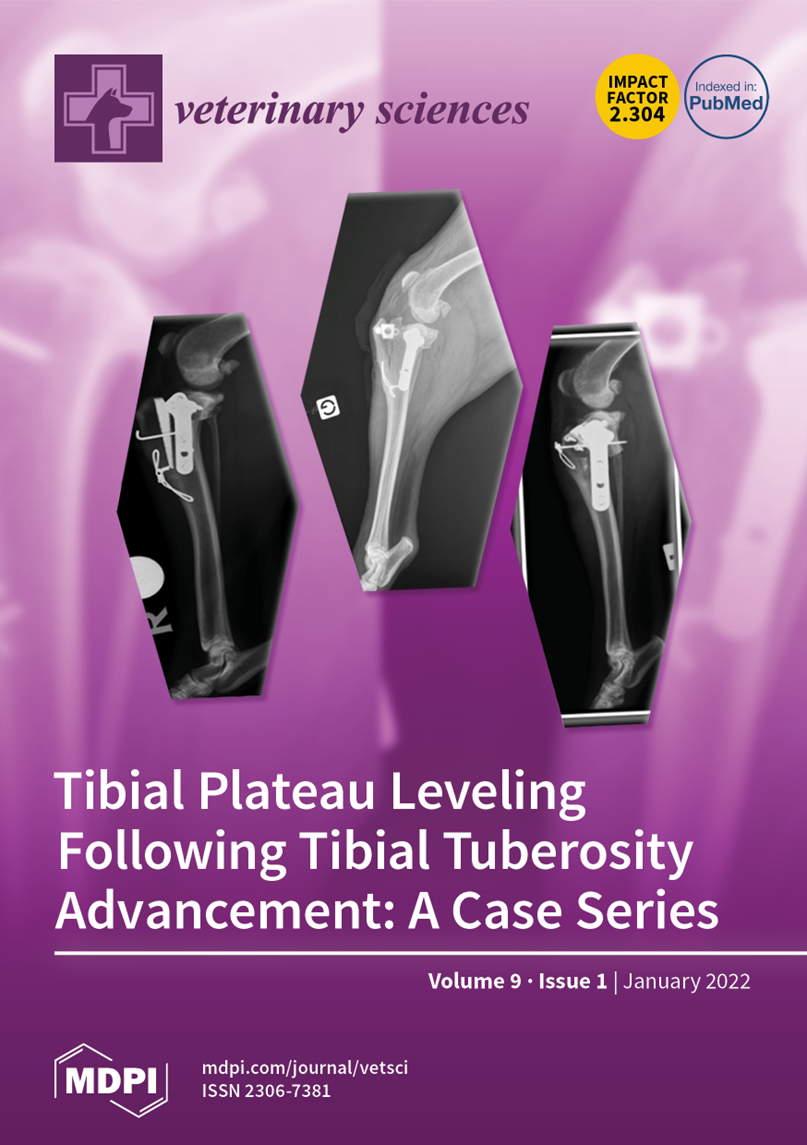 |
1. “Tibial Plateau Leveling Following Tibial Tuberosity Advancement: A Case Series” by Daniele Serrani, Pierre Paul Picavet, Juan Marti, Bernard Bouvy, Marc Balligand and Philip George Witte Vet. Sci. 2022, 9(1), 16; https://doi.org/10.3390/vetsci9010016 Available online: https://www.mdpi.com/2306-7381/9/1/16 |
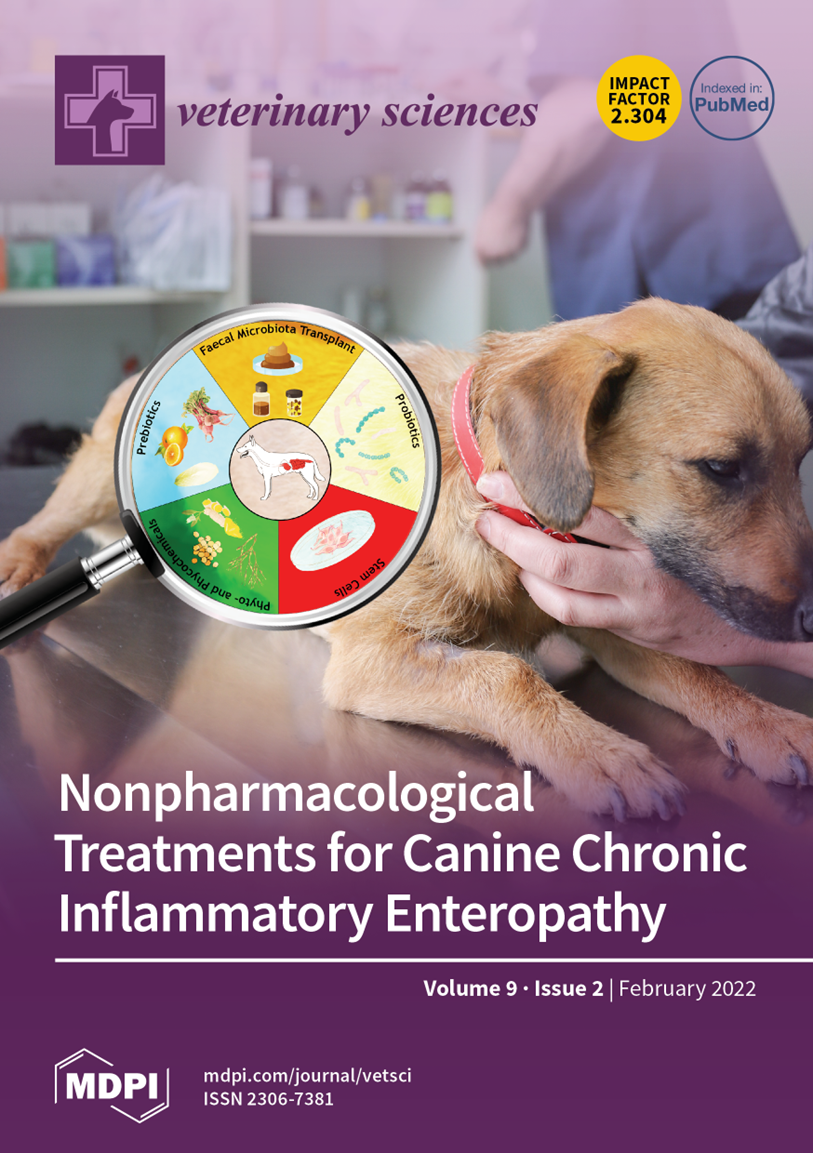 |
2. “Nonpharmacological Treatment Strategies for the Management of Canine Chronic Inflammatory Enteropathy—A Narrative Review” by Marco Isidori, Ronald Jan Corbee and Massimo Trabalza-Marinucci Vet. Sci. 2022, 9(2), 37; https://doi.org/10.3390/vetsci9020037 Available online: https://www.mdpi.com/2306-7381/9/2/37 |
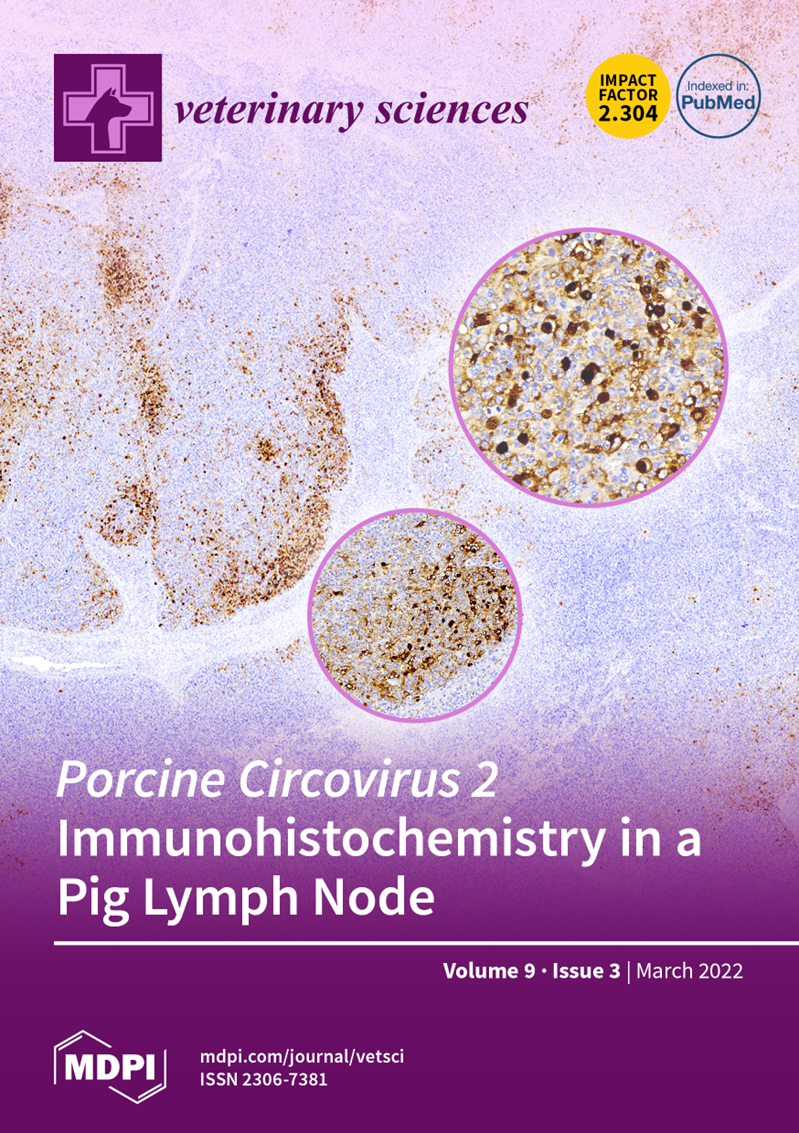 |
3. “Revisiting Porcine Circovirus Disease Diagnostic Criteria in the Current Porcine Circovirus 2 Epidemiological Context” by Joaquim Segalés and Marina Sibila Vet. Sci. 2022, 9(3), 110; https://doi.org/10.3390/vetsci9030110 Available online: https://www.mdpi.com/2306-7381/9/3/110 |
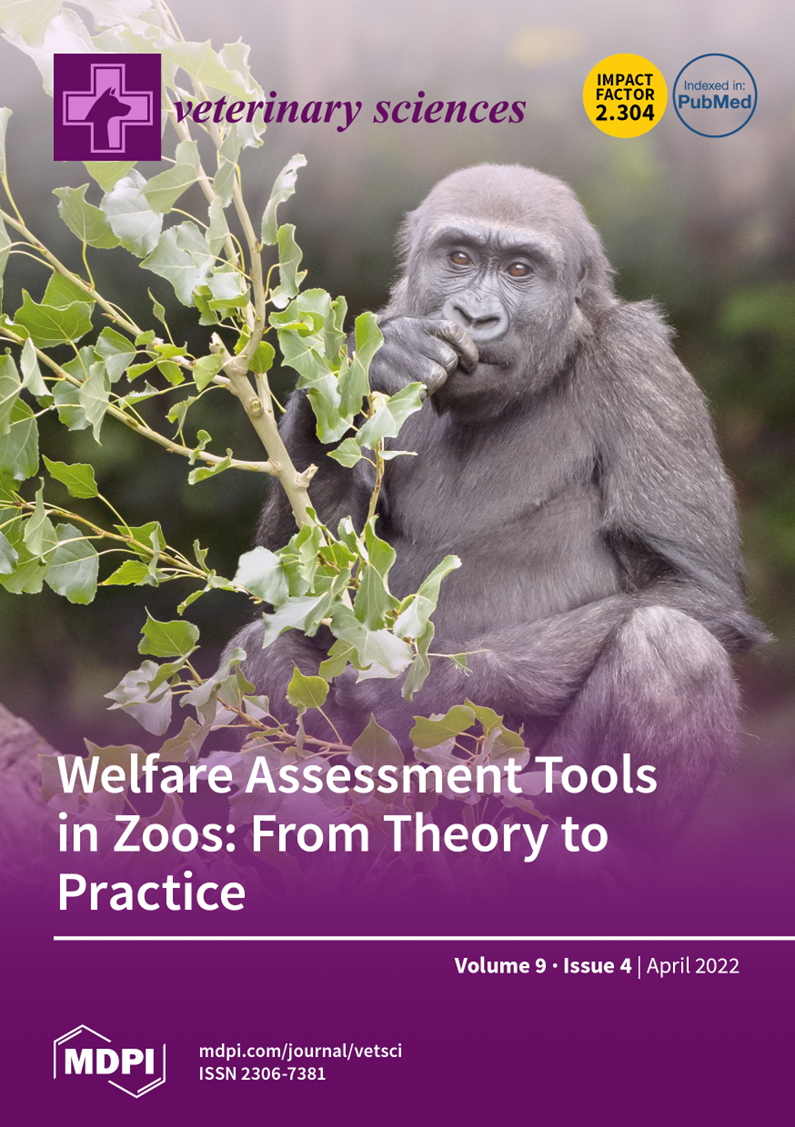 |
4. “Welfare Assessment Tools in Zoos: From Theory to Practice” by Narelle Jones, Sally L. Sherwen, Rachel Robbins, David J. McLelland and Alexandra L. Whittaker Vet. Sci. 2022, 9(4), 170; https://doi.org/10.3390/vetsci9040170 Available online: https://www.mdpi.com/2306-7381/9/4/170 |
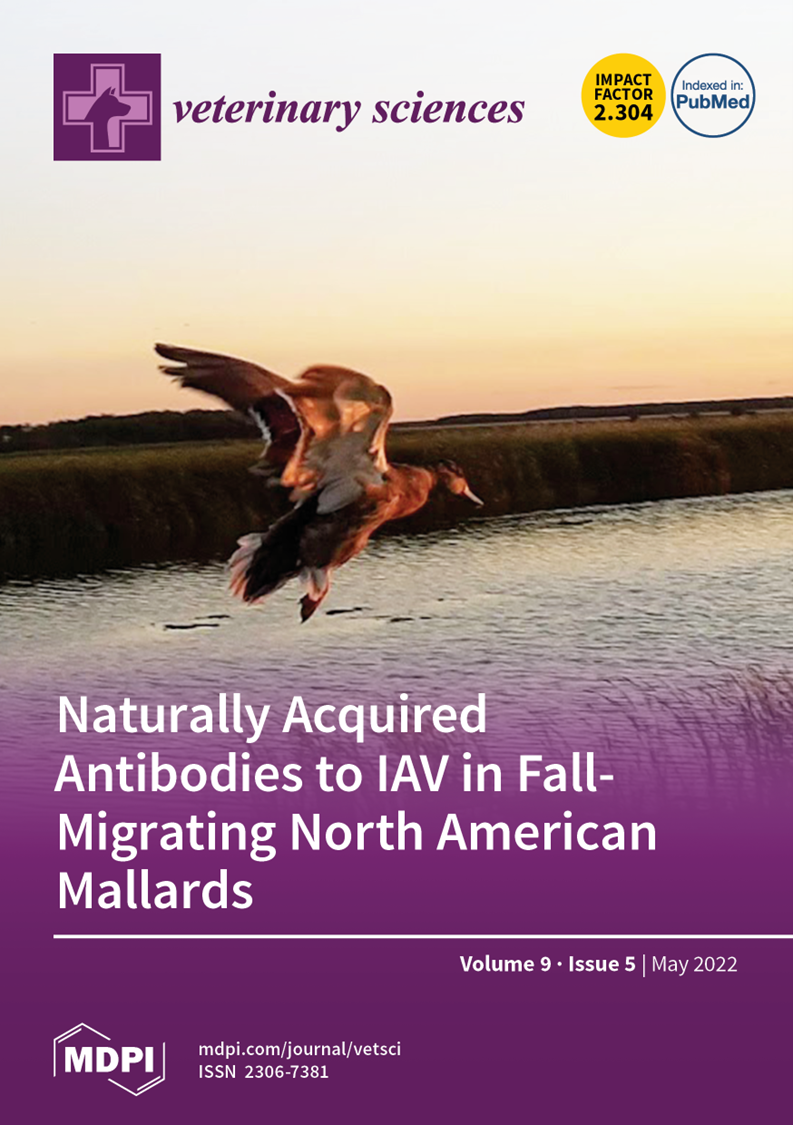 |
5. “Naturally Acquired Antibodies to Influenza A Virus in Fall-Migrating North American Mallards” by David E. Stallknecht, Alinde Fojtik, Deborah L. Carter, Jo Anne Crum-Bradley, Daniel R. Perez and Rebecca L. Poulson Vet. Sci. 2022, 9(5), 214; https://doi.org/10.3390/vetsci9050214 Available online: https://www.mdpi.com/2306-7381/9/5/214 |
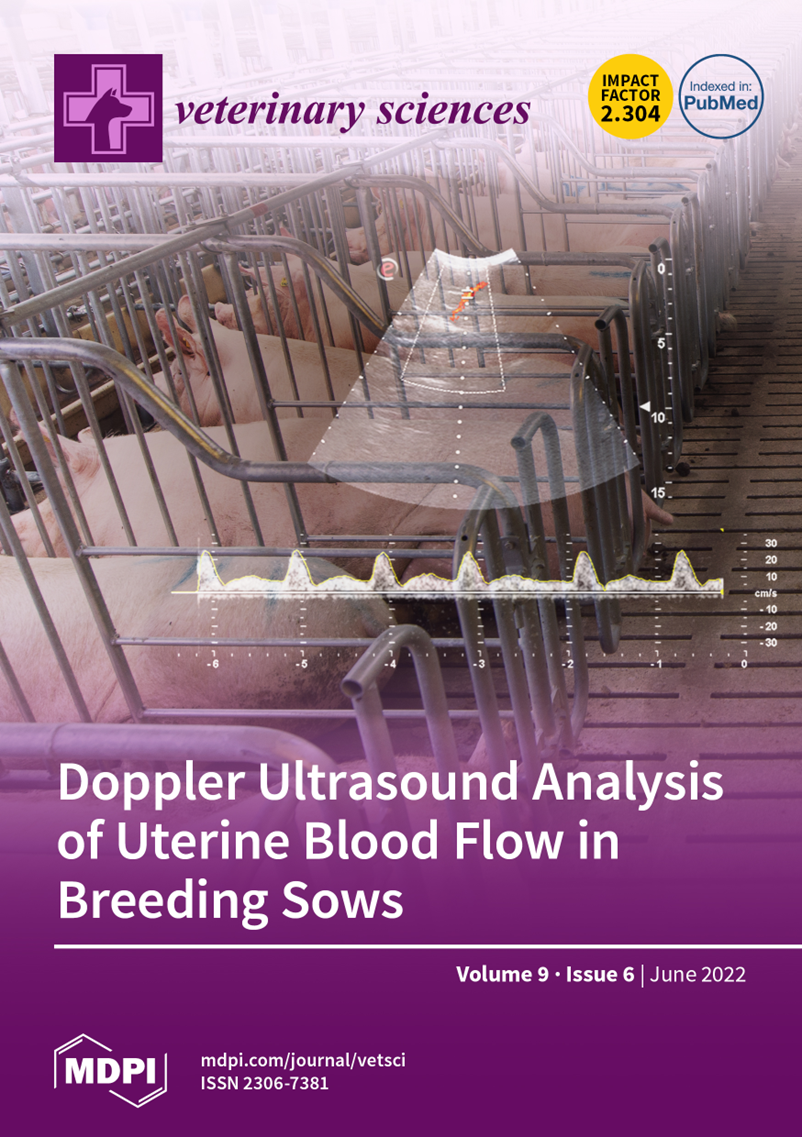 |
6. “Analysis of Uterine Blood Flow in Breeding Sows through the Estrus and Early Diestrus, and after Artificial Insemination” by Salvador Ruiz, Juan Carlos Gardón, Iván Hernández-Caravaca, Chiara Luongo and Francisco Alberto García-Vázquez Vet. Sci. 2022, 9(6), 260; https://doi.org/10.3390/vetsci9060260 Available online: https://www.mdpi.com/2306-7381/9/6/260 |
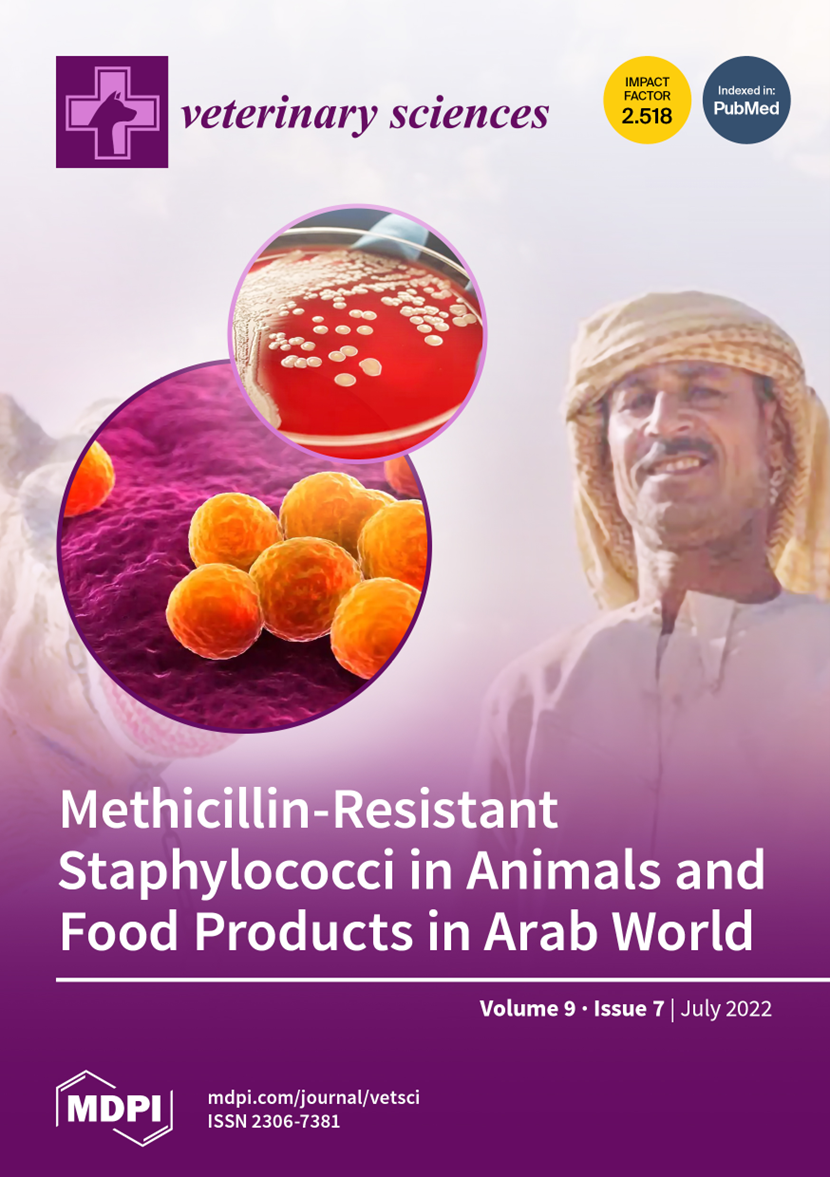 |
7. “Methicillin-Resistant Staphylococcus aureus (MRSA) and Other Methicillin-Resistant Staphylococci and Mammaliicoccus (MRNaS) Associated with Animals and Food Products in Arab Countries: A Review” by Chahrazed Belhout, Rachid Elgroud and Patrick Butaye Vet. Sci. 2022, 9(7), 317; https://doi.org/10.3390/vetsci9070317 Available online: https://www.mdpi.com/2306-7381/9/7/317 |
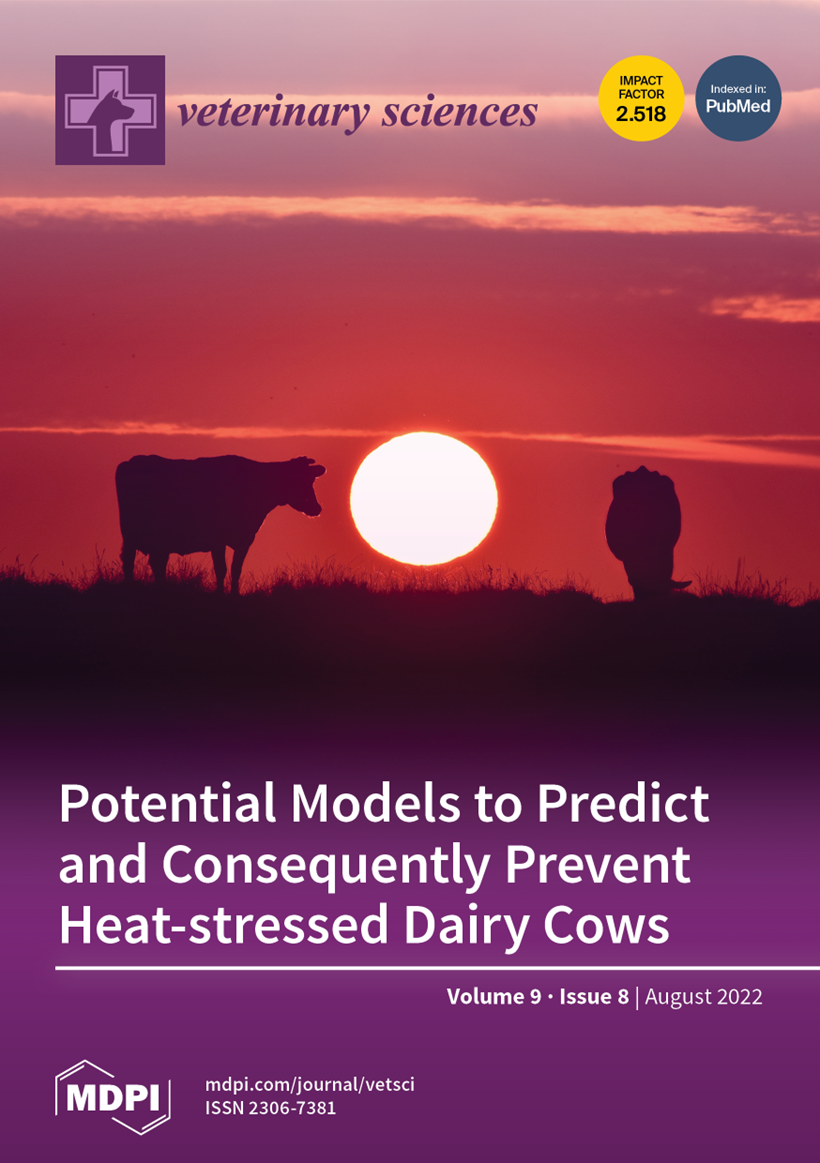 |
8. “Predictive Models of Dairy Cow Thermal State: A Review from a Technological Perspective” by Soraia F. Neves, Mónica C. F. Silva, João M. Miranda, George Stilwell and Paulo P. Cortez Vet. Sci. 2022, 9(8), 416; https://doi.org/10.3390/vetsci9080416 Available online: https://www.mdpi.com/2306-7381/9/8/416 |
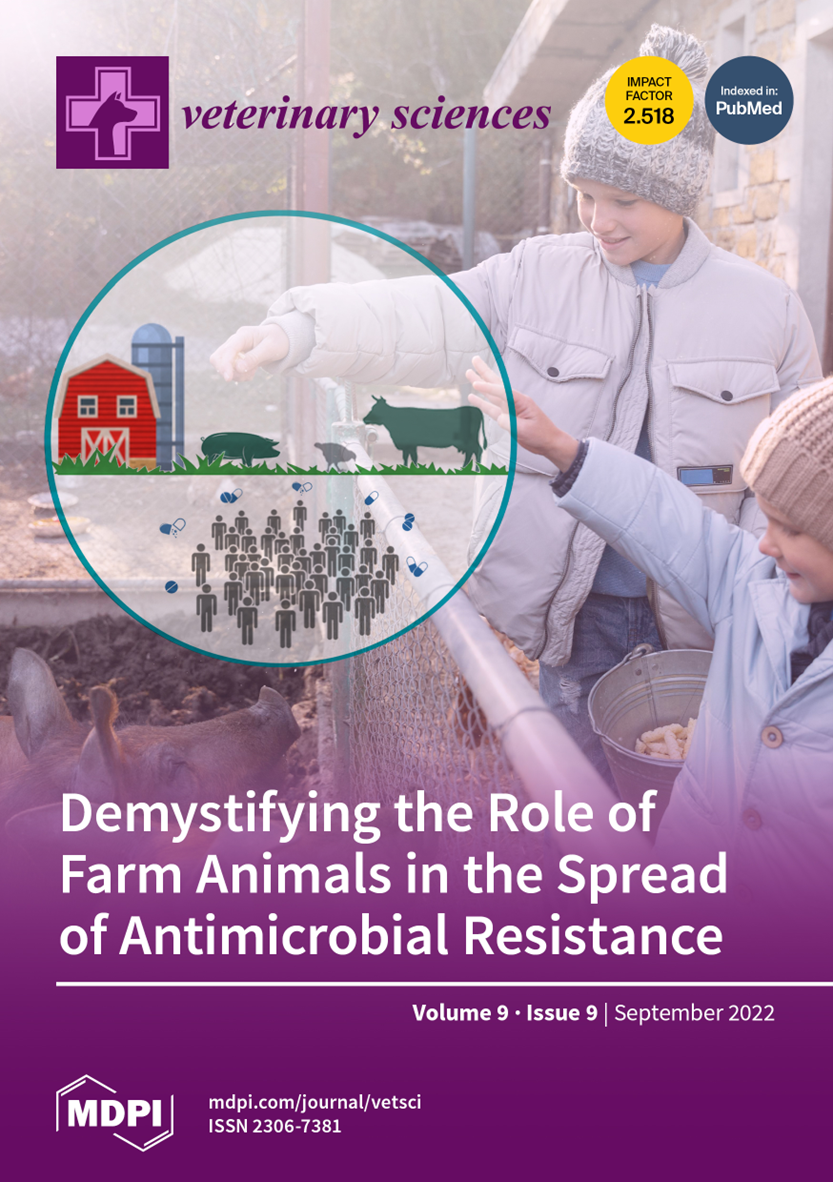 |
9. “Current Insights Regarding the Role of Farm Animals in the Spread of Antimicrobial Resistance from a One Health Perspective” by Mohamed Rhouma, Leila Soufi, Schlasiva Cenatus, Marie Archambault and Patrick Butaye Vet. Sci. 2022, 9(9), 480; https://doi.org/10.3390/vetsci9090480 Available online: https://www.mdpi.com/2306-7381/9/9/480 |
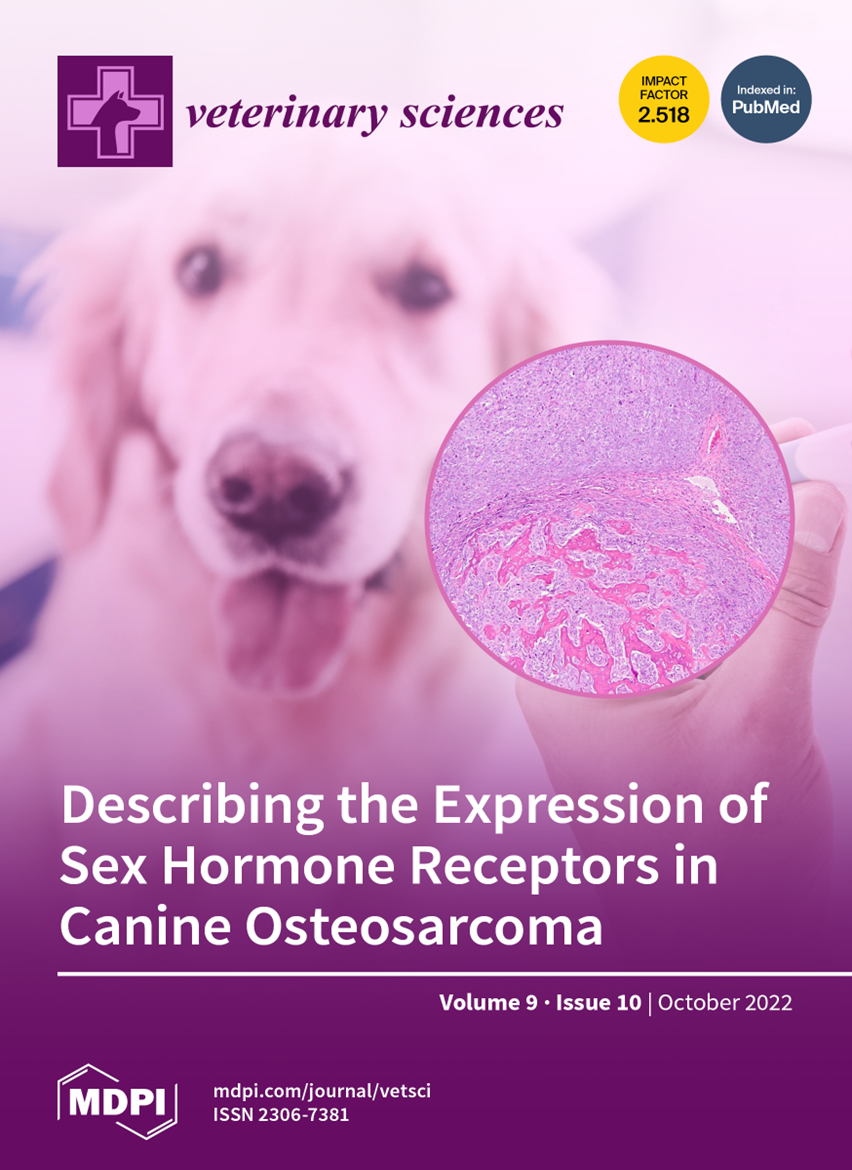 |
10. “Expression of Sex Hormone Receptors in Canine Osteosarcoma” by Kristyn N. Dilley, Alice Wong, Michael S. Kent, Michele A. Steffey and Clare E. Yellowley Vet. Sci. 2022, 9(10), 524; https://doi.org/10.3390/vetsci9100524 Available online: https://www.mdpi.com/2306-7381/9/10/524 |
 |
11. “Immune Activated Cellular Therapy for Drug Resistant Infections: Rationale, Mechanisms, and Implications for Veterinary Medicine” by Lynn M. Pezzanite, Lyndah Chow, Alyssa Strumpf, Valerie Johnson and Steven W. Dow Vet. Sci. 2022, 9(11), 610; https://doi.org/10.3390/vetsci9110610 Available online: https://www.mdpi.com/2306-7381/9/11/610 |
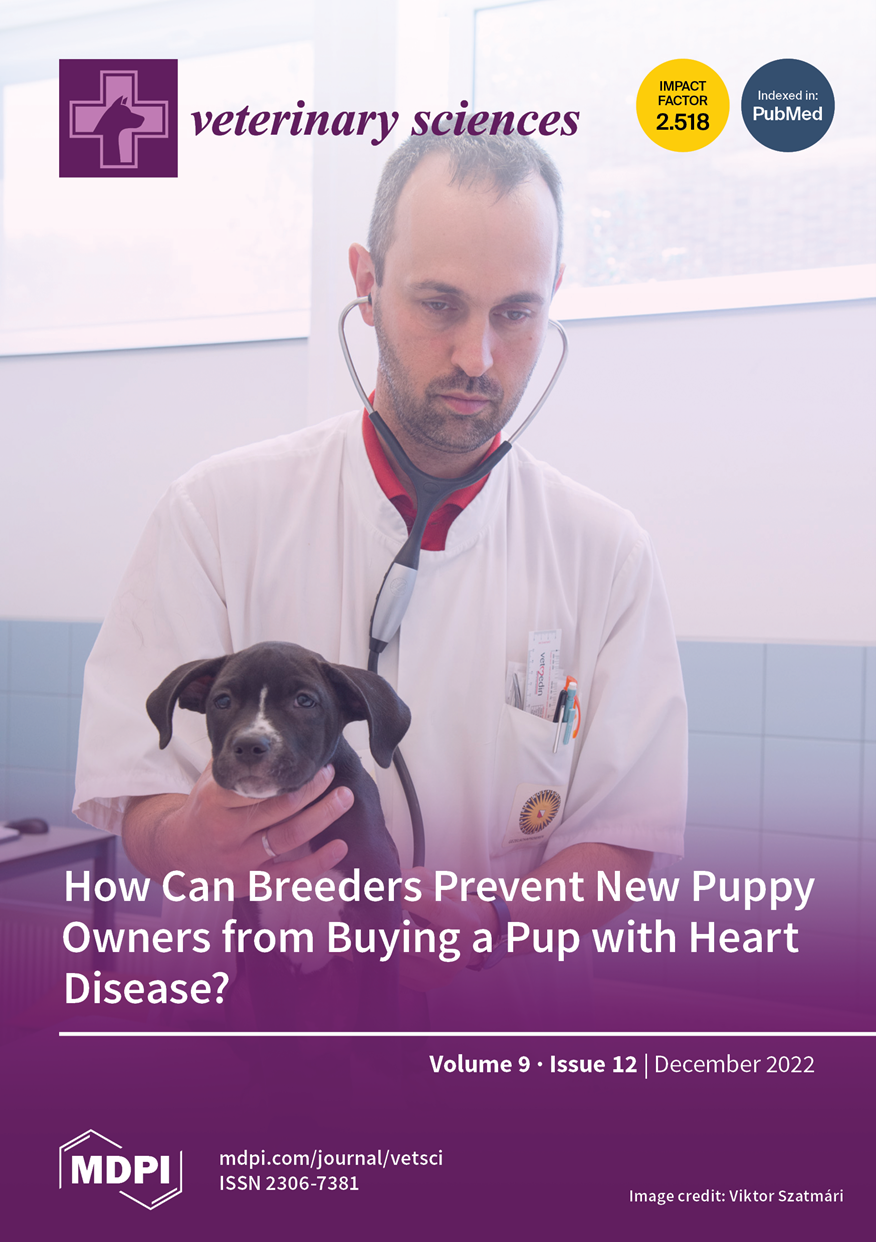 |
12. “Information Provided by Breeders and Referring Veterinarians about the Presence and Meaning of a Murmur to Owners of Newly Purchased Puppies with a Later Confirmed Congenital Heart Disease” by Vicky R. Vos and Viktor Szatmári Vet. Sci. 2022, 9(12), 678; https://doi.org/10.3390/vetsci9120678 Available online: https://www.mdpi.com/2306-7381/9/12/678 |
21 June 2023
Veterinary Sciences | Most Cited Papers in 2021 in the Section “Veterinary Biomedical Sciences”

The “Veterinary Biomedical Sciences” Section focuses on a broad spectrum of biomedical research in the field of veterinary sciences, from basic to applied and from translational to clinical. It is an interdiscipline between veterinary and biomedical sciences and is devoted to animal and human wellbeing and understanding, preventing and treating disease.
As all of the articles published in our journal are of an open access format, you have free and unlimited access to the full text. We welcome you to read our most highly viewed papers published in 2021 listed below:
1. “Molecular Characterization and Phylogenetic Analysis of Lumpy Skin Disease Virus Collected from Outbreaks in Northern Thailand in 2021”
by Tawatchai Singhla, Kittikorn Boonsri, Khwanchai Kreausukon, Wittawat Modethed, Kidsadagon Pringproa, Nattawooti Sthitmatee, Veerasak Punyapornwithaya and Paramintra Vinitchaikul
Vet. Sci. 2022, 9(4), 194; https://doi.org/10.3390/vetsci9040194.
Available online: https://www.mdpi.com/2306-7381/9/4/194.
2. “Cross Species Analysis and Comparison of Tumors in Dogs and Cats, by Age, Sex, Topography and Main Morphologies. Data from Vet-OncoNet”
by Katia Pinello, Isabel Pires, Ana Filipa Castro, Paulo Tiago Carvalho, Andreia Santos, Augusto de Matos, Felisbina Queiroga, Ana Canadas-Sousa, Patrícia Dias-Pereira, José Catarino et al.
Vet. Sci. 2022, 9(4), 167; https://doi.org/10.3390/vetsci9040167.
Available online: https://www.mdpi.com/2306-7381/9/4/167.
3. “Molecular Genetic Investigation of Digital Melanoma in Dogs”
by David Conrad, Alexandra Kehl, Christoph Beitzinger, Thomas Metzler, Katja Steiger, Nicole Pfarr, Konrad Fischer, Robert Klopfleisch and Heike Aupperle-Lellbach
Vet. Sci. 2022, 9(2), 56; https://doi.org/10.3390/vetsci9020056.
Available online: https://www.mdpi.com/2306-7381/9/2/56.
4. “Diagnosis and Prognosis of Canine Melanocytic Neoplasms”
by Rebecca C. Smedley, Kimberley Sebastian and Matti Kiupel
Vet. Sci. 2022, 9(4), 175; https://doi.org/10.3390/vetsci9040175.
Available online: https://www.mdpi.com/2306-7381/9/4/175.
5. “Treatment of Canine Oral Melanomas: A Critical Review of the Literature”
by Paolo Pazzi, Gerhard Steenkamp and Anouska J. Rixon
Vet. Sci. 2022, 9(5), 196; https://doi.org/10.3390/vetsci9050196.
Available online: https://www.mdpi.com/2306-7381/9/5/196.
6. “Histopathological and Immunohistochemical Evaluation of Canine Nerve Sheath Tumors and Proposal for an Updated Classification”
by Kristina Tekavec, Tanja Švara, Tanja Knific, Mitja Gombač and Carlo Cantile
Vet. Sci. 2022, 9(5), 204; https://doi.org/10.3390/vetsci9050204.
Available online: https://www.mdpi.com/2306-7381/9/5/204.




